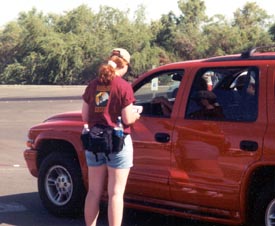

On-going questions in recreation and leisure services include:
What are people doing in their leisure time?
What do people want, such as programs and facilities, in their leisure time?
What benefits are derived by people who participate in different types of recreation activities and programs?
|
But there are many more questions to be asked and answered by park and recreation professionals. As a professional we need to know how to:
Two areas of concern in parks, recreation and leisure research are: |
 |
1. How much have we added to the amount of professional knowledge used to improve recreation and leisure as an applied and social science?
2. Can the existing research methodologies produce usable results?
According to Mitra & Lankford (1999), "The ultimate goal of leisure research is to produce an accumulating body of reliable knowledge that will enable use to explain, predict, and understand leisure phenomenon that interest us." This knowledge would be used to promote positive human growth and development through recreation and leisure services.
Therefore, it is imperative for park, recreation and leisure professionals to acquire the research skills necessary to read current professional research, design and conduct their own research projects.
Examples of Journals in Park, Recreation and Leisure Services |
| Journal of Leisure Research |
| Journal of Parks and Recreation Administration |
| Journal of Physical Education, Recreation, and Dance |
| LARnet the Cyber Journal of Applied Leisure and Recreation Research |
| Leisure/Loisir (formerly) Journal of Applied Recreation Research |
| Leisure Sciences |
| NIRSA Journal |
| Schole |
| Therapeutic Recreation Journal |
Why Do Research?
Systematic research can lead to more reliable decision making, problem solving and measure the benefits/contributions/values of recreation and leisure services. It determines how an agency uses it's resources efficiently. Research:
Helps create meaningful programs;
Increases our understanding of recreation and leisure behaviors; and
Helps justify the need for recreation and leisure programs and facilities.
Decision Making Process
recognition of a problem
collection and synthesis of information
develop possible solutions to the problem
selection and implementation of best solution
Five Characteristics of Research
|
It is systematic problem solving which identifies variables and tests relationships between them; | |
|
It is logical, so procedures can be duplicated or understood by others; | |
|
It is empirical, so decisions are based on data collected; | |
|
It is reductive, so it investigates a small sample which can be generalized to a larger population; and | |
|
It is replicable, so others may test the findings by repeating it. |
The Scientific Method
According to Smith & Glass (1987) there are seven steps involved in the Scientific Method.
Step 1: A theory about the
phenomenon exists.
Step 2: The researcher detects a research problem within the
theory and develops a research question for investigation.
Step 3: A research hypothesis is deduced from the propositions in
the theory. The research hypothesis is a statement about the relationship
between constructs.
Step 4: The researcher determines the operations (specific procedures or
methods) by which the constructs will be defined and states a hypothesis that
can be tested statistically. This hypothesis is called the null hypothesis. A
research design is developed as a plan for implementing the operations and
testing the null hypothesis. These operations, the null hypothesis, and the
design make up the guidelines for the study.
Step 5: The researcher conducts the study according to the guidelines.
Step 6: The null hypothesis is tested based on the data from the study.
Step 7: The original theory is revised or supported based on the results of the
hypothesis testing.
|
|
![]()
Researcher's Dictionary
Hypothesis: a tentative statement about relationships between two or more variables.
Theory: An explanation about the cause of a specific phenomenon by describing a relationship between variables or constructs.
Construct: A concept used to integrate in an orderly way diverse data.
Evaluation: Determining the worth of program services based on an analysis of systematically collected data.
![]()
Basic and Applied Research
Applied Research: studies conducted to provide answers to immediate problems or issues, such as program evaluations.
Basic Research: studies conducted toward long-range questions or advancing scientific knowledge.
The Research Process
There are seven steps recognized in a quality research project. They are:
Identify the Problem or Issue, and State the Possible Relationships of Variables
Review and Analysis of Relevant Literature and other Studies.
Specify the Hypothesis or Researchable Questions
Develop a research Plan and Study Design, and Decide on Data Collection Method(s)
Choose Subjects, Conduct the Study, and Collect the Data
Conduct Data Analysis, and Report Findings and Results
Discuss Implications or the Findings, make Recommendations, and Generalize Results
![]() Copyright
2001. Northern Arizona University, ALL RIGHTS RESERVED
Copyright
2001. Northern Arizona University, ALL RIGHTS RESERVED